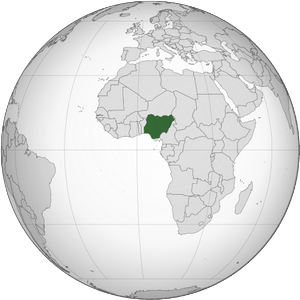VisasAfrican asylum-seekers may bear brunt of proposed travel curbs
As the White House mulls new travel restrictions on countries with high visa overstay rates, activists say African asylum-seekers may feel the consequences.

Nigeria's place on the African continent // Source: wikipedia.org
As the White House mulls new travel restrictions on countries with high visa overstay rates, activists say African asylum-seekers may feel the consequences.
The Wall Street Journal reported recently that the Trump administration was weighing rules aimed at nationals of countries with high overstay rates of business and tourism visas, known as B1s or B2s. According to the newspaper, the United States would warn countries to cut the overstay rates or see future visas harder to obtain and set for shorter periods. Such rules could be implemented soon through a presidential proclamation, a Department of Homeland Security (DHS) official told the political website Politico.
That means the nations with the highest rates of travelers overstaying their visas, rather than the ones that have the highest number overall, would feel the most impact of any new rules. African nations like Djibouti, Eritrea, Chad, Liberia, Somalia, Burkina Faso, South Sudan and Sudan are among those with the highest rates.
By comparison, only one African nation — Nigeria — is among the top 10 worldwide for most overstays overall, including both Visa Waiver Program (VWP) and non-VWP countries. The waiver program allows citizens of certain nations to visit the United States for up to 90 days without a visa.
Canada, Mexico, Brazil, Venezuela, the United Kingdom, Colombia, Nigeria, China, France and India each have higher totals than the 17 countries with the highest overstay rates combined, according to a VOA analysis of fiscal year 2017 DHS statistics.
VOA sent written questions requesting the outlines of the proposed restrictions and a list of countries likely to be affected to DHS and the White House but received no response.
“The government has chosen to focus on rates versus numbers because it fits their narrative that all immigrants are poor and brown or black,” Samah Mcgona Sisay, Equal Justice Works Fellow at New York-based rights group African Services Committee, said in an interview with VOA.
